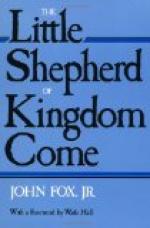Now they passed between upright, wooded, gray mountain-sides, threaded with faint lines of the coming green; now between gray walls of rock streaked white with water-falls, and now past narrow little valleys which were just beginning to sprout with corn. At the mouth of the creeks they saw other rafts making ready and, now and then, a raft would shoot out in the river from some creek ahead or behind them. In an hour, they struck a smooth run of several hundred yards where the men at the oars could sit still and rest, while the raft shot lightly forward in the middle of the stream; and down the river they could see the big Dillons making the next sharp turn and, even that far away, they could hear Jerry yelling and swearing at his patient brother.
“Some o’ these days,” said the old Squire, “that fool Jake’s a-goin’ to pick up somethin’ an’ knock that mean Jerry’s head off. I wonder he hain’t done it afore. Hit’s funny how brothers can hate when they do git to hatin’.”
That night, they tied up at Jackson—to be famous long after the war as the seat of a bitter mountain-feud. At noon the next day, they struck “the Nahrrers” (Narrows), where the river ran like a torrent between high steep walls of rock, and where the men stood to the oars watchfully and the old squire stood upright, watching every movement of the raft; for “bowing” there would have meant destruction to the raft and the death of them all. That night they were in Beattyville, whence they floated next day, along lower hills and, now and then, past a broad valley. Once Chad looked at the school-master—he wondered if they were approaching the Bluegrass—but Caleb Hazel smiled and shook his head. And had Chad waited another half hour, he would not have asked the question, even with his eyes, for they swept between high cliffs again—higher than he had yet seen.
That night they ran from dark to dawn, for the river was broader and a brilliant moon was high; and, all night, Chad could hear the swish of the oars, as they floated in mysterious silence past the trees and the hills and the moonlit cliffs, and he lay on his back, looking up at the moon and the stars, and thinking about the land to which he was going and of Jack back in the land he had left; and of little Melissa. She had behaved very strangely during the last few days before the boy had left. She had not been sharp with him, even in play. She had been very quiet—indeed, she scarcely spoke a word to him, but she did little things for him that she had never done before, and she was unusually kind to Jack. Once, Chad found her crying behind the barn, and then she was very sharp with him, and told him to go away and cried more than ever. Her little face looked very white, as she stood on the bank, and, somehow, Chad saw it all that night in the river and among the trees and up among the stars, but he little knew what it all meant to him or to her. He thought of the Turners back at home, and he could see them sitting around the big fire—Joel with his pipe, the old mother spinning flax, Jack asleep on the hearth, and Melissa’s big solemn eyes shining from the dark corner where she lay wide-awake in bed and, when he went to sleep, her eyes followed him in his dreams.




